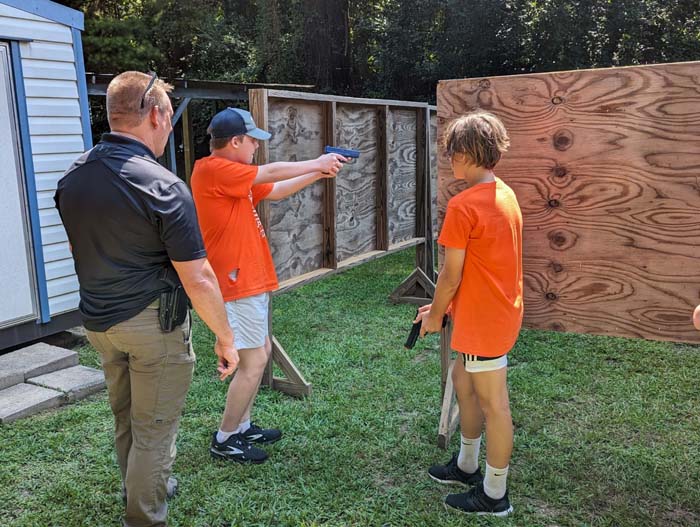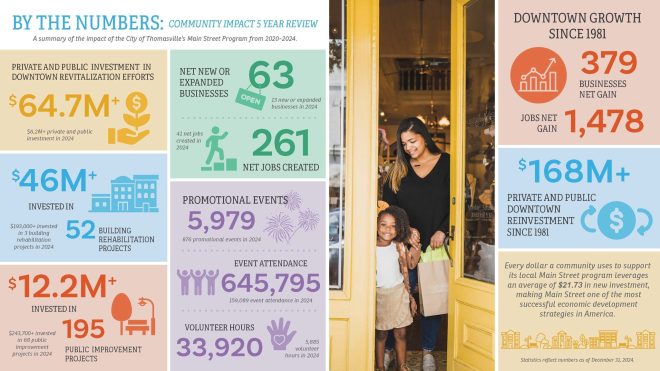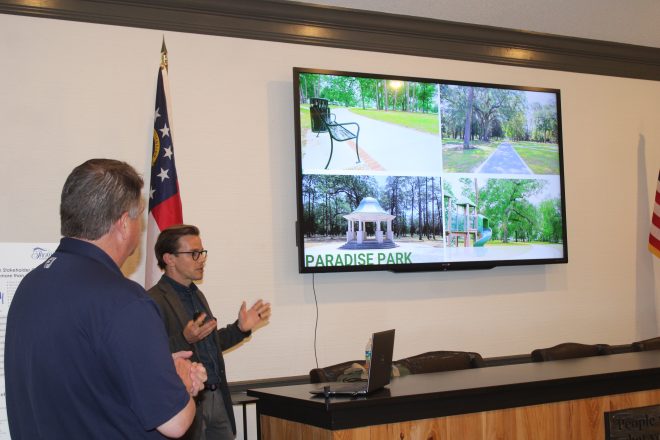Junior Law Enforcement Academy exposes young cadets to numerous specialities
Published 9:04 am Friday, July 28, 2023

- THE PERFECT SHOT: Kids got to visualize what it would be like to pursue a criminal earlier in the week at TPD’s Junior Law Enforcement Academy.
THOMASVILLE- Cadets at Thomasville Police Department’s Junior Law Enforcement Academy have had an exciting week, viewing all the specialty forces housed at the department.
According to Cpl. Crystal Parker, the cadets have had a full week of learning. They first heard from a Georgia Bureau of Investigation (GBI) bomb technician on Monday morning, before hearing from TPD’s own Crime Scene Investigator Lisa Maxwell.
Trending
Tuesday, the cadets heard more from TPD, when they were introduced to the Vice/Narcotics Unit, hearing from Detective Chris Baggett and the Criminal Investigation Division, hearing from Lieutenant Toby Knifer. They also got to see the different ways the TPD gives back to the community, by helping Hands on Thomas County at Second Harvest.
Wednesday proved to be a full day for the campers, beginning with police fitness test that morning.
Parker said the kids ran the fitness test, before they heard from Marty West with the U.S. Marshal’s Office and Freddie Robinson at the Department of Juvenile Justice.
While listening to West field questions from the cadets, Parker learned the young officers-in-training didn’t know what to do in the event of an active shooting. The cadets explained they had done drills at schools with their teacher, but no one had ever talked to them or prepared them for what may take place on any given day.
Upon hearing this, Parker asked Major Wade Glover to speak to the children.
Glover has been an officer for 34 years, working in almost every role in the police department, with the exception of Chief of Police.
Trending
“You could say I have little bit of experience,” he told the cadets. “But, the most experience I have is dealing with people that might become an active shooter.”
Glover said everyone, not just students, have to be prepared for “active killing events.”
“We don’t just call them active shooting events anymore, because they are killing people with everything: guns, knives, bombs, cars,” Glover explained. “With that being said, you have to be prepared.”
In order to be prepared, Glover shared the 3 step response everyone should have in active killing event: run, hide and fight.
“In these types of events, we have about a 3-minute response time to your school,” Glover said.
To show what could happen in just three minutes, Glover began clapping his hands, using it to symbolize bullets being fired.
“That’s a lot of people that can die in a short amount of time, so you have to take responsibility to defend and save your life,” he told them.
Glover explained that although it is a scary thought, it can happen anywhere and to anyone. However, if an active killing event were to happen at school, teachers know the plan and will do their best to lead all the students to safety. But, if the teacher is injured, students have to be prepared to fight for their lives.
“If they see you, do whatever you have to do to take them out,” Glover instructed. “You can’t negotiate with these people. For them, it’s about killing as many people as they can and fame.”
Glover said it is common among law enforcement officers to no longer name the suspect in mass killing events, because they don’t want the killer to be famous.
“When we go in there at mass killing events, we are not there to talk them down,” he said. “We are there to shoot them in the face, because they are killing our babies and they will kill again.”
Glover put the situation in perspective for the cadets, sharing he has a 5-year-old grandchild in school. However, law enforcement is trained to find the shooter before tending to the wounded.
He said even if he saw his grandchild had been shot or hurt, he would find the shooter first to ensure no one else could be shot, before returning to tend to his grandson.
“We have to stop the killing first, then we can stop the dying,” he said.
While waiting for law enforcement, Glover reminded the cadets to run, hide or fight. He said no matter where individuals go, they should always make note of the exit signs in the event they had to flee quickly.
“Have a plan no matter where you go,” he said. “Take ownership in your life, what you do matters. If you don’t run, you’re the first target.”
There are other ways to avoid being a target, though. Glover told the cadets to try and hide if they can’t make it to an exit and as a last resort find anything they can and attempt to fight the shooter or delay them.
With these new tips in mind, the cadets thanked Glover for his speech. Parker shared with the cadets they would be visiting the fire station the following day to learn CPR.
While some of the cadets were excited to hear from the firefighters, most had already found their favorite part of the week.
Chloe Gillis enjoyed hearing from West earlier that morning, sharing that he taught them how to enter a room where someone may be hiding.
“You kind of have to move around like you’re in a circle,” she explained.
Saralynn Fielder also enjoyed hearing from West, but found Vice/Narcotics to be one of her favorite topics.
“Being that part of my family had a weird thing with that, I’ve known a lot about drugs for a while now and been able to tell the signs of it, but I feel like that would be a really interesting field to go into,” Fielder said.
Fielder, 16, said the Junior Law Enforcement Academy has only confirmed her previous thoughts about going into law enforcement, with it currently ranking as her second choice behind the medical field.
Parker was happy to hear this, stating multiple cadets come back year after year to learn more, before eventually committing to a career in law enforcement.





